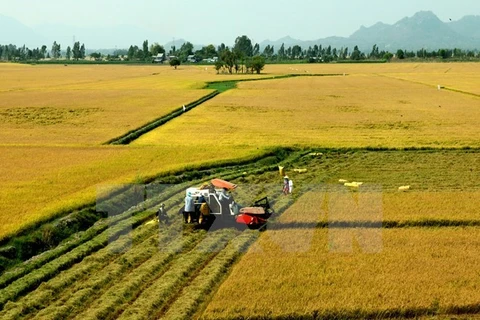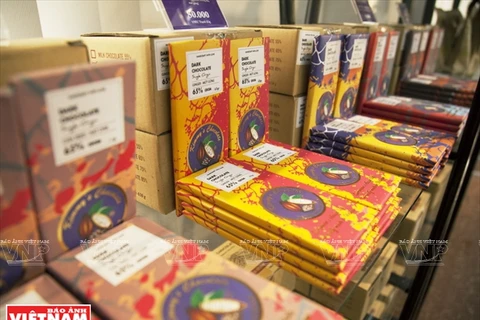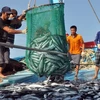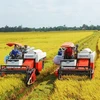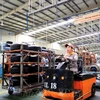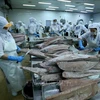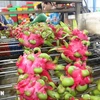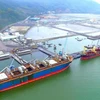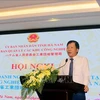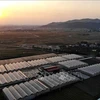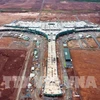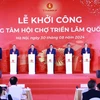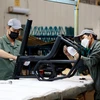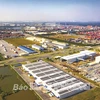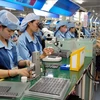 The Maison Marou free chocolate tasting class is open for everyone on a first-come-first-serve basis. (Photo: Maison Marou Fanpage)
The Maison Marou free chocolate tasting class is open for everyone on a first-come-first-serve basis. (Photo: Maison Marou Fanpage) Hanoi (VNS/VNA) - There is an opportunity for Vietnamese chocolate to become a niche player in the world market with a brand of unique flavoured cocoa, according to the Belgian ambassador to Vietnam.
“You can find almost any quality chocolate product in Belgium, but there is one with a nice fresh, fruity and a sour taste that is very difficult to find, the Vietnamese chocolate,” Paul Jansen, Belgian Ambassador to Vietnam, said at a workshop to help Vietnam’s unique cocoa take a spot in the world market held in Hanoi on November 18.
“Origin chocolate products have become very popular worldwide, but Vietnamese chocolate remains a rare chocolate to find,” he said.
Vietnam should have programmes to promote cocoa production in a sustainable way and with a guarantee of a fair income for the cocoa growers. A sustainable cocoa sector will be crucial, meaning no deforestation, no child labour, and a good income for the farmers, according to the ambassador.
“If Vietnam can increase the sustainable cultivation of its unique flavoured cocoa, chocolate producers and customers will follow,” Jansen said.
“At the Belgian embassy we are available to give support, to search for available support, and to link up with our industry. Given that Belgium and Vietnam have a strategic partnership on agriculture, given that Vietnamese cocoa has a high potential and Belgium has a lot of expertise to offer, let’s try together to give the Vietnamese cocoa bean the status it deserves.”
Speaking at this workshop organised by the Belgian Embassy and the Ministry of Agriculture and Rural Development (MARD), Nguyen Do Anh Tuan, head of MARD’s International Cooperation Department, said Vietnam’s agriculture is on the path of deep international integration, gradually asserting its position in the global supply chain.
“Vietnam’s agricultural sector is strongly restructuring towards building value chain products based on the potential advantages and strengths of each agricultural product, including cocoa.”
Vietnamese cocoa received huge international recognition after it won the International Cocoa Awards in 2013 and was classified as Fine or Flavour Cocoa by the ICCO in 2015 thanks to its unique fruity flavour, he said. However, the cocoa production in Vietnam has tended to decline sharply from 25,000ha in 2015 to 5,000ha in 2019.
Le Thanh Tung, Deputy Director of MARD’s Department of Crop Production, said the economic efficiency of cocoa is lower than that of other crops such as coffee and cashew.
"The difficulties for Vietnamese cocoa at present are small cocoa planting areas intercropping with other industrial trees and weakness in pre-processing and processing of chocolate,” Tung said.
“Therefore, if foreign investors want to develop cocoa production in Vietnam, they will face difficulties in developing material areas for cocoa."
Truong Ngoc Quang, Director of Nam Truong Son Cocoa Co., Ltd., also agreed and said there are not concentrated material regions, making it difficult for businesses in purchasing cocoa.
Tung said it is necessary to build a link between farmers and businesses and between small businesses with large corporations, helping to develop a comprehensive and sustainable cocoa industry in the future.
Quang said the State management agencies should have a suitable development plan for cocoa trees. In addition, there should be a mechanism for those linkages and price policy between businesses and farmers.
The chocolate industry consumes over 4 million tonnes of cocoa beans from around the world, with chocolate consumption growing at an average rate of 5 percent. While the chocolate industry is getting wealthier year after year the cocoa farmers are not benefiting enough from that system and remain extremely poor. Most of the cocoa supply (close to 70 percent) comes out of West Africa where the industry problems are the most severe, according to the workshop statement.
If major markets such as the EU and US impose stricter regulations it will open new doors for countries with sustainable supply chains to fill the gap. The demand for sustainable cocoa is growing steadily, a demand which Việt Nam can fulfil while other countries struggle to comply.
For access to the European market for Vietnamese cocoa, there are three different ways and Vietnamese players can choose the second and third ways. The first way is to export cacao beans from Vietnam to the EU. The second way is to export cocoa powder and the third way is to export chocolate products which create a lot of value, according to Gricha Safarian, General Manager, Puratos Vietnam.
Besides that, Tuan said the EVFTA has a part relating to protection of geographical indications. At present, the EU protects the geographical indications for 38 Vietnamese products, excluding cocoa.
“In the future, when the domestic cocoa industry develops further, the EU can consider to issue the protection of geographical indication for Vietnamese cocoa due to the unique taste of this product, although the cocoa output is not as high as coffee output,” Tuan said./.
VNA


